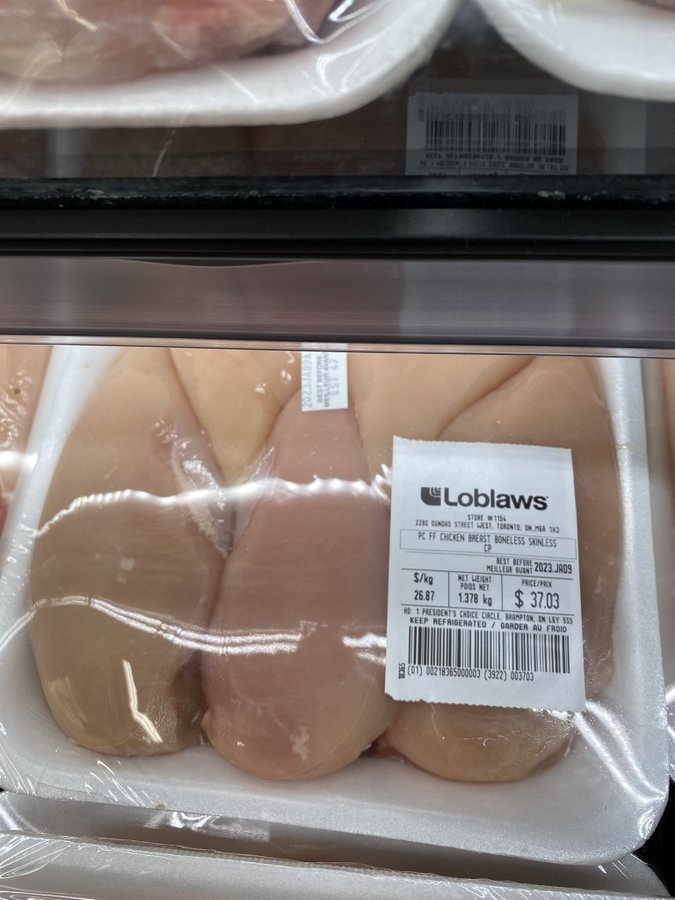Some consumers are fighting skyrocketing food costs by coordinating a boycott of grocery giant Loblaw in May.
Emily Johnson, a mental health and addictions worker in Milton, is one of the coordinators of the boycott. Her Reddit Loblaws Is Out Of Control page has skyrocketed to over 58 thousand followers in recent days as more and more angry shoppers get on board. The page is packed with posts from people who say they will participate in the boycott. There’s also a list of demands to Loblaw that includes signing a grocery code of conduct and committing to affordable pricing. Both Loblaw and Walmart have yet to agree to the federal government’s Grocery Code Of Conduct – with Loblaw chairman Galen Weston saying his company is concerned that the code could “raise food prices for Canadians by more than $1 billion.”
A Loblaw flyer, posted to Reddit by Loblaws Is Out Of Control compares prices from 2019 to 2024. In most cases, prices for the items have almost doubled.

Loblaw is the focus of a great deal of political and public scrutiny. Last year, the company faced backlash after a CTV reporter tweeted a photo of a five-pack of poultry being sold at a Toronto Loblaws for $27/kg. The tweet was viewed by millions of people.

Galen Weston was called out for setting ridiculously high prices during inflation. He defended the price saying that the chicken was a “specialty product”, adding “”I think these are examples of customers gravitating towards the highest priced items when there’s a perfectly competitively priced chicken right next door. And we looked at our chicken prices across the entire enterprise and are very confident that we’re offering terrific value. As a matter of interest, we lose money on every breast of chicken that we sell.”
According to a Globe and Mail article published on April 2nd, Loblaw Cos. Ltd. paid its new chief executive Per Bank $22.1 million last year, including a one-time $18-million award to replace compensation that he forfeited by resigning from his former employer.
Mr. Bank replaced Galen Weston, who remains chairman of the board and Loblaw’s controlling shareholder. His package includes a $1.315 million annual salary, a target annual bonus of nearly $2 million, and a target of $7.2 million in annual long-term incentives for the current year.
Last February, Loblaw Cos. Ltd. reported its fourth-quarter profit and sales rose compared with year ago. Revenue totalled $14.53 billion, up from $14.01 billion a year earlier. Food retail same-store sales rose by 2.0%, while drug retail same-store sales increased 4.6%, with front store same-store sales growth of 1.7 % and pharmacy and health-care services same-store sales growth of 8.0%.
A petition asking the federal government to investigate Loblaw Companies Ltd. and introduce legislation to prevent the monopolization of essential goods is also gaining traction. The petition on change.org refers to profiteering and “greedflation”. It has garnered over 10,000 signatures since it went online in February 2023.
According to Forbes, food inflation is slowing year-over-year; food purchased from stores grew at 1.9% in March, compared to 2.4% in February, 3.4% in January and 4.7% in December. That may not be much comfort to people struggling to fill their refrigerator. The average family of four is expected to spend $16,297.20 on food in 2024, up $701.79 from last year.
Forbes also states that Canadians are spending less on food, but this reduced expenditure suggests shoppers are decreasing the quality and quantity of food they are buying. Last week, Dalhousie University’s Agri-Food Analytics Lab released a study that found many consumers are open to consuming “risky foods” despite the potential health risks. Their research showed that 58% of respondents said higher prices made them more inclined to eat food close to or past its best-before date. About 37% said their consumption habits haven’t changed.
A Nanos survey conducted for CTV earlier this month indicated that 32% of the 1,000 people surveyed said grocery stores were the top reason for the sharp rise in food prices, up from 28% in 2023. More than 20% blame increased fuel costs for the rise in prices, a three-percentage point increase from last year. The survey also found that nearly one-in-five Canadians say they, or someone they know, has used a food bank in the past year.
Have your say by voting in our poll:




